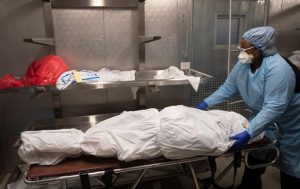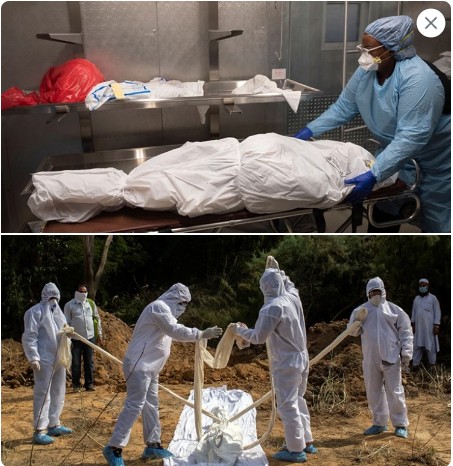Coronavirus: the first three months as it happened

22 April 17:05 bst — Deaths suggest the coronavirus was in the United States weeks earlier than thought
The first US COVID-19 death might have occurred in California on 6 February — three weeks before the first reported death, in Washington state.
After autopsies, three people who died in Santa Clara County between 6 February and 6 March have been confirmed as having died of COVID-19, according to a statement released by the county’s department of public health on 21 April. The updated statistics include two people who died at home and a third whose location of death was not specified. Previously, the first COVID-19 death in the county was thought to have occurred on 9 March.
The revised cause of death shows that the deadly disease had footholds in the United States earlier than previously thought. Similar reports have surfaced elsewhere in recent weeks. In late March, a non-peer-reviewed epidemiology study of the Lombardy region in northern Italy found that the virus might have been circulating there for more than a month before it was detected.
22 April 16:45 bst — Climate scientist and IPCC veteran dies of the coronavirus
John Houghton, a climate scientist and a senior member of the Intergovernmental Panel on Climate Change (IPCC), died of COVID-19 on 15 April, aged 88.
Houghton was the lead editor of the first three IPCC assessment reports — massive, influential studies that summarize the state of scientific knowledge on climate change — and accepted the 2007 Nobel Peace Prize on behalf of the organization, alongside former US vice-president Al Gore. Researchers who knew Houghton commended him for his scientific rigour, his leadership and his ability to connect with policymakers and the public.
After studying at the University of Oxford, UK, Houghton became a professor there in 1958. He was a pioneer in the use of emerging satellite technologies for understanding the Earth system. As the director-general of the UK Met Office, the nation’s weather agency, from 1983 to 1991, he helped to establish the Hadley Centre for Climate Science and Services in Exeter and advised the UK government on the scientific consensus on climate change. “He knew they could only really make progress if they had very clear and well-communicated scientific advice,” says Richard Betts, a climate scientist at the University of Exeter, who worked on several IPCC reports with Houghton.
Houghton’s lifetime of leadership in the climate-change community is a significant legacy, Betts says. “He wasn’t just a scientist. He was someone who cared passionately.”
A devout Christian, Houghton co-founded and led the John Ray Initiative, a charity in Gloucester, UK, focused on promoting environmental stewardship through both science and Christianity. He convinced a prominent US evangelical lobbyist of the compatibility of climate change and Christian thought in the early 2000s.
His former students remember him fondly. “John was an excellent leader,” says James Drummond, a retired atmospheric scientist who most recently worked at Dalhousie University in Halifax, Canada. Houghton supervised Drummond through his undergraduate and graduate studies at Oxford in the 1970s. “If I do a quarter of what he did, I will be doing very well,” says Drummond.
21 April 20:40 bst — 1,500 people volunteer for controversial vaccine-study approach
Momentum is building to speed the development of coronavirus vaccines by intentionally infecting healthy, young volunteers with the virus. A grass-roots effort has attracted nearly 1,500 potential volunteers for the controversial approach, known as a human-challenge trial.
The effort, called 1Day Sooner, is not affiliated with groups or companies developing or funding coronavirus vaccines. But co-founder Josh Morrison hopes to show that there is broad support for human-challenge trials, which have the potential to deliver an effective coronavirus vaccine more quickly than standard trials.
Typical vaccine trials take a long time because thousands of people receive either a vaccine or a placebo, and researchers track who becomes infected in the course of their daily lives. A challenge study could in theory be much faster: a much smaller group of volunteers would receive a candidate vaccine and then be intentionally infected with the virus, to judge the efficacy of the immunization.
“We want to recruit as many people as possible who want to do this, and pre-qualify them as likely to be able to participate in challenge trials should they occur,” says Morrison, who is also the executive director of organ-donation advocacy group Waitlist Zero. “At the same time, we feel that the public policy decisions around challenge trials will be better informed if they highlight the voice of people interested in participating in such trials.”
Morrison says that the people who have signed up to be part of a challenge trial tend to be young and live in urban areas, and are highly motivated to do something constructive to address the coronavirus pandemic. “Many note that they recognize the risk but believe the benefits of vaccine acceleration are so tremendous that it is worth it to them,” he says.
A team led by bioethicist Nir Eyal at Rutgers University in New Brunswick, New Jersey, argued that a human challenge trial could be conducted safely and ethically, in a paper in The Journal of Infectious Diseases last month.
The approach is also gaining some political support. This week, 35 members of the US Congress, led by Bill Foster (Democrat, Illinois) and Donna Shalala (Democrat, Florida), called on Department of Health and Human Services director Alex Azar to consider human-challenge trials of coronavirus vaccines.
Charlie Weller, head of the vaccines programme at Wellcome, a biomedical-research funder in London, says the charity has begun discussing the ethics and logistics of a human-challenge trial for a coronavirus vaccine. But she says it is unclear whether such a trial could actually speed vaccine development. Researchers first need to determine how to expose humans to the virus as safely as possible, and to consider how and even whether such studies can be done ethically. “I think there’s potential,” Weller adds, “but we’ve got so many questions to work through to understand whether it can help in the timelines we have.”
21 April 15:30 bst — Coronavirus brings forward Mars plans
The Arab world’s first Mars mission — a spacecraft called Hope — will ship from the United Arab Emirates (UAE) to Japan weeks earlier than planned, as a result of travel restrictions imposed during the COVID-19 pandemic.
Accelerating the shipment will mean that the probe, which will orbit the red planet and study the Martian atmosphere, will miss out on some planned tests. “We had to expedite activities in Dubai and basically focus only on the critical testing,” project leader Omran Sharaf told a virtual meeting of the Mars Exploration Program Analysis Group, a NASA-led international forum for planning Mars activities, on 17 April. “It got too risky for us if we waited,” he said.
Built by UAE and US engineers, the orbiter is scheduled to launch from Tanegashima Space Center in Japan in a window that starts on 15 July, when Earth and Mars are suitably aligned. The craft should reach Martian orbit in 2021.
Workers in cleanroom suits move a crate around the Hope probe at The Mohammed Bin Rashid Space Centre
The United Arab Emirates’ Mars probe at the Mohammed Bin Rashid Space Centre in Dubai.Credit: Natalie Naccache for Nature
Hope was scheduled to ship to Japan by cargo plane in early May. But mission leaders brought the date forward to 20 April, to account for a 14-day quarantine imposed on all travellers entering the country. Team members who travel with the probe will be quarantined for two weeks when they reach Japan, but moving the spacecraft early gives them enough time to arrive at the site and prepare for launch.
A team that will receive the craft in Japan has already travelled to the nation and been in quarantine.
The mission team has also had to navigate new restrictions on travel worldwide, including getting approval to fly at all, said Sharaf. The UAE’s airspace and airports are closed, and Japan has enhanced its visa requirements.
Last month, the European Space Agency and the Russian space agency Roscosmos delayed launch of a major rover in their ExoMars mission for two years, citing travel restrictions imposed as a result of the coronavirus pandemic among their reasons.
Relatives wearing protective gear prepare to bury the body of a COVID-19 victim in New Delhi, India
Relatives of a person who died of coronavirus at a burial in New Delhi.Credit: Danish Siddiqui/Reuters
17 April 16:00 bst — Wuhan death toll jumps by 50%
China’s reported death toll from the coronavirus has jumped sharply, after a review of records for the city of Wuhan, where the virus emerged last year, added another 1,300 fatalities to its official count. The revision raises the death toll in the 11-million-person city by 50%, to 3,869, and brings China’s overall death toll to more than 4,600.
Deaths from the coronavirus are difficult to count in the absence of widespread testing. Chinese officials said the revision included the addition of deaths of people at home and at medical institutions that weren’t reporting data to its epidemic network.
15 April 15:00 bst — Infections pass two million
The number of reported COVID-19 cases worldwide has passed two million, according to data compiled by researchers at Johns Hopkins University in Baltimore, Maryland. The milestone comes just two weeks after one million infections were recorded. The United States has the most cases — more than 600,000 — followed by Spain and Italy.
The death toll from the disease has also surged past 128,000 worldwide. Some 24,000 people have died in the United States, with more than 20,000 deaths in Italy.
The pandemic has spread to almost every region of the globe, with only about a dozen of the World Health Organization’s member states not yet reporting cases. The majority of these are small island nations in the Pacific Ocean, including Vanuatu, Tuvalu and Palau.
EM Coronavirus, causing SARS
